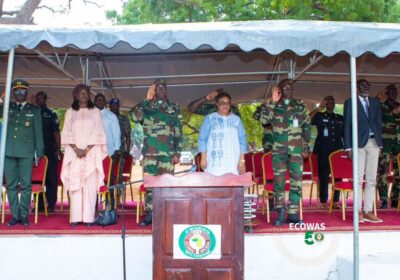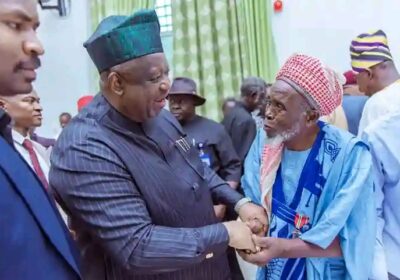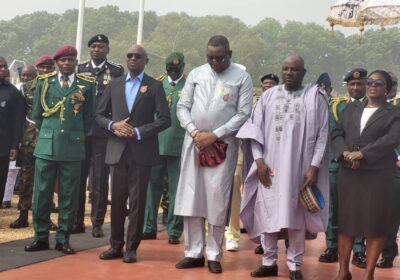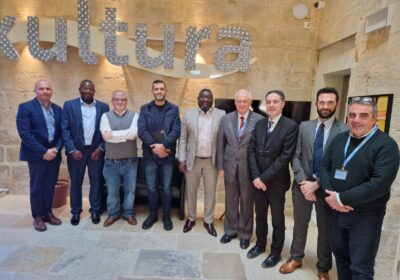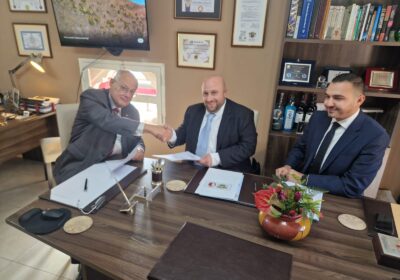Nigeria, UNDP Collaborate on African-Rooted Democracy to Stem West Africa’s Political Drift.
By Raymond Enoch
Nigeria has launched a landmark Regional Partnership for Democracy (RPD) in collaboration with the United Nations Development Programme (UNDP), rallying West African nations and development partners behind a bold new push to protect and renew democracy across the sub-region.
Unveiled at a high-level signing ceremony in Abuja Nigeria, the initiative brings together governments, civil society, youth networks and development partners to tackle rising democratic fragility, disputed elections, shrinking civic space and the spread of disinformation in West Africa. Hosted by the Ministry of Foreign Affairs and the UN Resident Coordinator’s Office, the RPD Secretariat will operate from Abuja as a regional public good, open to all West African countries, including those outside ECOWAS.
Welcoming diplomats, UN officials, civil society leaders and representatives of partner governments, Nigeria’s Minister of Foreign Affairs, H.E. Yusuf Tuggar, said the launch marked “not merely the opening of a programme, but a new chapter in Africa’s democratic journey.” He paid tribute to the United Nations system in Nigeria and development partners for their technical guidance and confidence in Nigeria’s leadership, stressing that the RPD is the product of months of regional consultations, technical work and engagements with youth, traditional authorities, academics and the diplomatic corps.
Tuggar framed the partnership as President Bola Ahmed Tinubu’s strategic contribution to continental governance reform, describing the RPD as “Nigeria’s gift to the strengthening and flourishing of democracy in Africa.” He warned, however, that democratic governance on the continent is under mounting strain despite instruments such as the African Union’s Peer Review Mechanism and various national reforms. He cited credibility deficits in elections, persistent political violence, weak citizen participation in decision-making, a growing culture of administrative impunity among some political office-holders and the weakening of judicial and media institutions.
According to him, these structural weaknesses too often culminate in unconstitutional changes of government or protracted political instability, conditions which fuel insecurity and violence and undermine the aspirations of the AU’s Agenda 2063 to silence the guns in Africa. At the heart of the problem, Tuggar argued, is the uncritical transplantation of governance models that fail to reflect African cultural contexts, norms and historical experiences, generating friction that easily turns into stagnation, fragility and abuses of power.
The RPD, he explained, rests on the proposition that democracy flourishes most sustainably when it is rooted in African values and attuned to local peculiarities, while drawing judiciously from global best practices. He described the framework as a carefully calibrated synthesis of African realities and international standards – a design he believes can give democracy genuine ownership, legitimacy and durability among citizens across West Africa.
Under the new framework, Nigeria and UNDP, working with interested West African states and partners, will pursue a series of mutually reinforcing objectives: strengthening electoral institutions and promoting credible, transparent polls; deploying early-warning and rapid-response mechanisms against unconstitutional changes of government; elevating youth, women, persons with disabilities and civil society as indispensable democratic actors; building safeguards and platforms to counter disinformation and misinformation, especially during elections; and supporting long-term institutional reforms that embed rule of law, accountability and public trust. The RPD is aligned with Agenda 2063 and Sustainable Development Goal 16 on peace, justice and strong institutions, positioning it as both an African and global response to the democratic recession in parts of the continent.
Although Nigeria and the UN Office in Abuja are the initial signatories, Tuggar stressed that the RPD is open to co-ownership by all. He described it as a regional public good intended not solely for ECOWAS Member States, but for all West African nations, reflecting the reality that African values do not stop at the borders of ECOWAS or the Alliance of Sahel States. As the framework begins to show impact, Nigeria expects other African regions seeking home-grown, sustainable democratic models to join or adapt the initiative, turning West Africa into a continental reference point for democratic innovation.
On behalf of the UN system, UNDP officials have hailed the RPD as proof that Nigeria is not only shaping the regional democratic landscape but also charting a path for Africa-led, Africa-owned transformation. The partnership is framed as a compact of values anchored on strengthening democratic institutions and accountability, broadening inclusive citizen participation, promoting credible and transparent electoral systems and fostering regional cooperation and peer learning so democracy delivers tangible results. UNDP has pledged to mobilise financing, technical expertise and robust fiduciary oversight to ensure the programme is implemented to the highest standards of transparency and accountability.
Tuggar also used the platform to warn against a “post-truth era” in which facts are increasingly contested and sections of the media risk reinforcing echo chambers of ignorance. Drawing on contrasting global commentaries about youth protests, he argued that discontent is less about age or geography and more about the gap between expectations and actual delivery, amplified by the rapid pace of social media. He insisted that the RPD is well-placed to help tackle the “Gordian knot of misinformation and disinformation” that threatens to further erode trust in democratic institutions.
As the ceremony drew to a close, the foreign minister urged attendees to return to their capitals and institutions as ambassadors of the RPD, committed to broadening its reach and deepening its partnerships. To development partners and “all friends of Africa,” he extended an open invitation to support the initiative, describing it as an African solution to an African challenge – credible, politically viable and technically sound.
“Let us build a future,” Tuggar said, “in which democracy in Africa is not imposed nor borrowed, but authentically owned, culturally grounded and therefore enduringly strong.” With the Abuja launch, Nigeria and UNDP have signalled that the battle against coups, weak institutions and democratic fatigue in West Africa will be fought not with imported blueprints, but with home-grown, people-centred solutions that place African values at the heart of governance.



